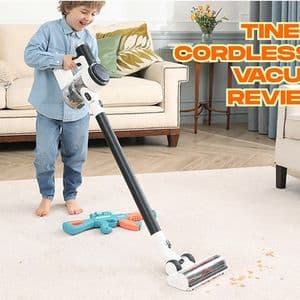Understanding Dyson Vacuums
Dyson vacuums are known for their bagless technology and consistent suction. They typically use cyclonic separation to remove dust and debris while maintaining airflow, ensuring minimal loss of suction during use.
They also feature advanced filtration, making them suitable for allergy management. Dyson offers cordless stick vacuums, upright models, and canister vacuums, each with design differences to fit different cleaning needs.
KeyFactors to Consider Before Choosing
Your Home Layout
Before narrowing down what Dyson should I buy, consider your home size, flooring type, and layout.
-
Hardwood and tile floors: Lightweight, cordless stick vacuums may be suitable.
-
Carpet-heavy homes: Models with strong brush roll and motorized heads are often more efficient.
-
Multi-level homes: Lightweight or cordless models ease stair cleaning.
Your Cleaning Habits
How often do you vacuum? Daily quick cleans may align better with cordless models, while deeper weekly cleans may benefit from larger capacity upright vacuums.
Filtration Needs
If you have allergies or pets, focus on models with HEPA filtration. This ensures smaller dust particles and allergens are captured and sealed within the vacuum.
Types of Dyson Vacuums
Cordless Stick Vacuums
These are popular due to their convenience and portability. They are lightweight, easy to maneuver, and often come with attachments for above-floor cleaning. Battery life and suction power vary by model.
Upright Vacuums
Upright models generally have a larger dustbin and powerful suction, making them effective for deep carpet cleaning. They can be heavier than stick vacuums but often include a longer power cord for extended reach.
Canister Vacuums
These models have a canister connected by a hose, offering flexibility in cleaning stairs and tight spaces. They often provide strong suction and a variety of attachments.
Specialty Models
Dyson also offers models designed for pet owners and those with allergy concerns. These models typically include advanced filtration systems and motorized tools for pet hair removal.
Read more: https://toolhome.org/dyson-vacuu/
Breaking Down Common Dyson Features
Cyclonic Technology
This is Dyson’s core technology, using centrifugal force to capture dirt and dust.
HEPA Filtration
High-efficiency filters trap small particles, supporting a cleaner air environment.
Battery Life
Cordless models vary in battery performance, with higher-end models providing up to an hour of cleaning per charge.
Attachments
From crevice tools to motorized brush heads, these attachments help in cleaning different surfaces efficiently.
Bin Size
Consider your cleaning frequency and home size to determine if you need a larger or smaller dustbin.
Matching Dyson Models to Your Needs
Still wondering what Dyson should I buy? Consider these practical scenarios:
-
For small apartments: A lightweight cordless stick vacuum offers ease for quick cleaning sessions.
-
For families with pets: A model with a motorized brush and HEPA filter helps manage pet hair and allergens.
-
For large homes: An upright vacuum with strong suction and a larger dustbin may reduce the need for frequent emptying.
Maintenance Considerations
While Dyson vacuums require less maintenance than bagged vacuums, regular cleaning of filters, brush bars, and dustbins helps maintain performance. Most Dyson filters are washable, reducing replacement costs.
Comparing Dyson to Other Brands
You might also wonder how Dyson compares to other brands. For instance, while Dyson vacuums are praised for suction power and design, a tineco vacuum stick may offer competitive battery life and LED lights for floor visibility. Understanding these differences helps you assess what features matter most to you.
Sustainability and Dyson
Dyson emphasizes engineering products for longevity and reducing environmental impact. Their vacuums are designed with recyclable components, supporting waste reduction while maintaining efficiency.
Final Thoughts
Choosing what Dyson should I buy comes down to matching your lifestyle with a vacuum that aligns with your floor type, cleaning frequency, and filtration needs. Understanding your living environment and how you clean will guide you in choosing the right vacuum without confusion.
By focusing on these practical details, you can confidently select a vacuum that supports cleaner living without unnecessary complications.










